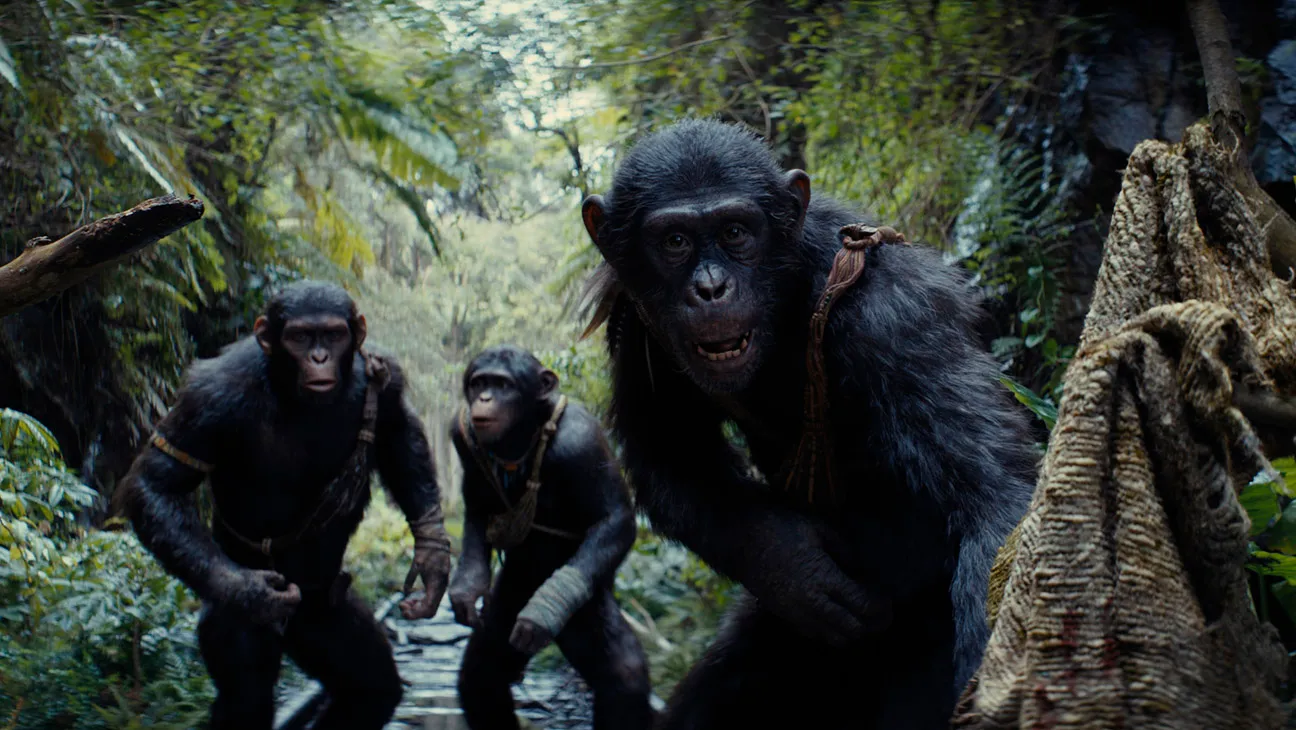
The Planet of the Apes is a beloved sci-fi franchise that was rebooted and reinvigorated beginning in 2011 with Rise of the Planet of the Apes and culminating with 2017’s War for the Planet of the Apes after a successful run in the 1960s and 70s. The trilogy renewed interest and set standards for visual effects in film, making yet another attempt at resuscitating the franchise so soon after its latest success a tall task. Writer/director Wes Ball sets out to do just that as the franchise returns to multiplexes.
Picking up three centuries after the end of War for the Planet of The Apes, Kingdom of the Planet of the Apes introduces us to a new clan of Falconer apes through Noa (Owen Teague), son of the eagle-king Koro (Neil Sandilands), his best friend Anaya (Travis Jeffrey), and Soona (Lydia Peckham) as they prepare to learn their clan’s trade of commanding eagles. The night before, their clan is attacked by the army of Proximus Caesar (Kevin Durand) a nearby monarch who enslaves other apes in hopes of using their combined strength to usher in a new age for their kind. Noa survives and embarks on a journey to free his clan where he soon meets an unusually smart human named Mae (Freya Allan) and learns of a forgotten past that could determine the future of the planet for apes and humans alike.
The Planet of the Apes franchise has always been a metaphorical conduit through which audiences have able to examine and assess the foibles of our own world and Kingdom continues that tradition in interesting new ways. In this film, the specter of Caesar and his legacy in leading apes toward a civilization of intelligent beings looms large in more ways than one. An “Order of Caesar” quasi-religious group exists which seeks to carry on his ideas of unity amongst apes and peace between apes themselves as well as humans, even continuing to bear his symbol of a diamond within a circle. Proxima Caesar however, carries Caesar’s legacy on in a more twisted way, using his now hallowed reputation as a way to elevate himself by self-appointing as his successor to lead apes to a glorious accelerated evolution and using that power in ways to control and brutalize others. Caesar being elevated in death as a messianic, religious figure calls to mind human beings’ own long history of figures deifying themselves to horrific results and creating followers who do harm in their name, whether intentionally as Proxima does or unintentionally in the case of Caesar who has been posthumously anointed as a infallible. The film uses this burgeoning world as lens into how humanity works in relations to this figures, particularly during our own current moment where forces of personality seem to be on the rise.
The modern take on the Apes franchise has now become synonymous with dazzling visual effects and this new entry does not disappoint. It carries on the tradition with seamless CGI creations of sentient apes complete with the mouth movements required for speech and the physical dexterity of chimpanzees, orangutans, bonobos, and gorillas. The environments in which they inhabit also appear as realistic as possible despite many of them undoubtedly being CGI as well. The CGI characters blend into the scenery well creating a visual canvas that never feels artificial and instead feels lived in and appropriately post-apocalyptic in its depiction of the remnants of human civilization. What also stands out with Kingdom’s cinematography is the camera movement of the film’s many action scenes. They almost exclusively feature the apes, as does the entire film, and the camera moves and swings rapidly to match the pace and agility of the apes they are following while they use their dexterity to fight each other. It’s immersive and gives the action a realistic feel of the brutality and physicality involved with these creatures.
Kingdom of the Planet of the Apes had a very tough act to follow in a trilogy reboot that many feel may be the best modern blockbuster film franchise around. It carries on the legacy of that trilogy, and the franchise in general, superbly with a well balanced adventure story that advances it’s individual characters and the larger groups of apes and humans in both the self contained story and the continuation of the franchise tale. The visual effects are flawless and the action is thrilling and worthy of the big screen. Thematically, the depth that the Apes franchise is known for carries on as well with examinations of religion and cults of personality using metaphor to speak to our world with a well placed seed of hope that sets the stage for an intriguing potential sequel. It clocks in at a robust two hours and twenty-five minutes, but the film is so perfectly paced and engaging that it barely feels like two. Living up to something as good as the previous trilogy is insanely hard to do and this film does it.
Image: 20th Century Studios

